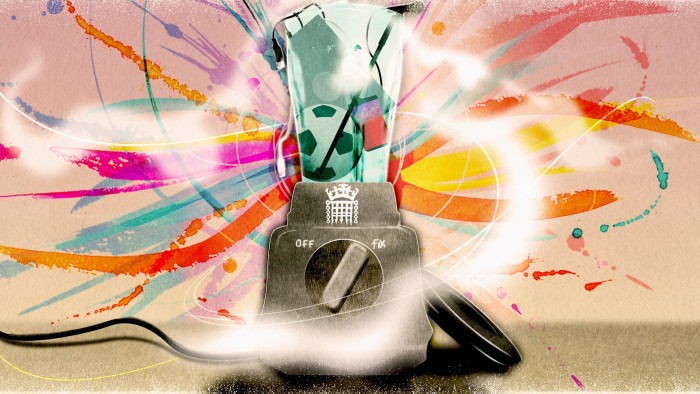Unlock the Editor’s Digest for free
Roula Khalaf, Editor of the FT, selects her favourite stories in this weekly newsletter.
How much profit should touts be allowed to make reselling concert tickets? What are the appropriate flavours of vapes? How do you stop a football club owner from changing the team’s colours or mismanaging it into bankruptcy? How do you spare people from the horror of different computer charging cables?
What unites these thorny questions is that apparently they are all issues for the government. Each of the above is the subject of current legislation or consultation. Measures include a price cap on the resale cost of tickets and, unforgivably, a new football regulator. This is not a partisan point; the football regulator was initially a Tory plan. Nor is this solely a British problem; the common chargers policy is an EU regulation that the UK is thinking of following.
Even as a concertgoing, computer-using supporter of a lowly football club, I have to wonder if it is the job of government to save me from disappointment, irritation or overpaying. The correct value of a concert ticket is what I am prepared to pay for it. If I cannot watch QPR, listen to Oasis or use a single cable, life will go on.
Even where there is a broader argument for action, as with vapes, there is over-reach. The case for state control of flavours — (imagine the meeting in Whitehall: “Now, watermelon bubblegum?”) — to reduce their appeal is dubious, especially as the same legislation bans sales to under-18s.
Some activity is merely government as performance. The new crime bill, will, at the behest of the shopworkers union, create a special offence of assault on retail staff which courts can punish more harshly. But the chair of the National Police Chiefs’ Council has said it would “not make a difference” to the police’s approach. It is hard to see how it will act as a deterrent either, given that assault is already a crime.
This is “kiss-it-better” government, the desire to show oneself as a force for good, responding to campaigns, headlines and polls. Often such measures get through because they are cheap.
It would be easy to dismiss these as frivolous examples of over-reach, though it is a constant surprise how much of this legislation exists. But the mindset that underpins it is not limited to the trivial and its effects are not always harmless. The decent desire to stamp out incitement against minorities, for example, now too often leads to the police descending on the homes of those who have said something nasty on social media.
Over-reach also encourages displacement activity, an alternative to more difficult but unrewarding action. Take housebuilding, where previous governments faced pressure from those who could not afford to buy a home. Unwilling to pay the political costs of facing down Nimbys and increasing supply through planning reform, Tory ministers opted instead to subsidise mortgages by offering loans to first-time buyers, which simply kept prices high by shoring up demand. Labour is now attempting that wider reform.
Of course, some expansions of state activity are socially desirable. There are, for instance, persuasive public policy arguments for the hefty government subsidies on the cost of childcare, both in helping to increase the workforce and, at a time of falling birth rate, to ease the financial pressures on parents.
But even here, electoral calculations and the instinct to act can widen scope and drive up costs. This policy began under Tony Blair mainly to help women back to work. It was heavily expanded under Rishi Sunak to try to win back support from young families and will now go further under Keir Starmer with plans for breakfast clubs at schools. Childcare support enjoys near universal political backing even among those who are quick to cry nanny state on other issues (though some prefer straight tax breaks for parents). It is likely to keep growing. The only cap on expansion is the Treasury. My point here is not to argue against the principle but to note the ratchet that turns targeted help into a wider state obligation.
The instinct to intervene runs across the political spectrum. It is true that some free-market Tories are fanboying Argentina’s state-slashing president, Javier Milei, but the moment their party is presented with potential cuts it finds reasons to oppose them.
The trend is clear. New regulations and regulators to protect us; new services the state can provide for us; new forms to complete; new subsidies to help us cope financially.
But when even Labour leaders accept that taxes have reached the limits of public tolerance, that the civil service is too large, borrowing too high and regulators hampering economic activity, then a harder truth is clear. The instinct to act means the state is trying to do too much and while government is getting bigger, there is less evidence it is getting much better.
There will always be reasons for intervention but leaders who cannot even stay out of secondary ticketing offer little hope of limiting and improving the services of the state. Britain has a public which does not want to hear that problems are not a matter for government and too few politicians who wish to tell them that.
A first step would be resisting the knee-jerk, trivial and performative interventions. The time is fast approaching when people need to rework the celebrated advice of JFK and stop asking what their government can do for them.



